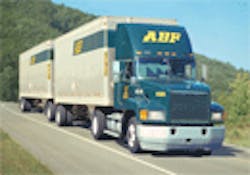Arkansas Best Corp. has announced that its subsidiary, ABF Freight System, Inc., did not obtain the necessary votes from its International Brotherhood of Teamsters (IBT) employees to implement modifications to the IBT's current National Master Freight Agreement (NMFA) labor contract with ABF.
The proposed modifications included a 15% reduction in all wages paid under the NMFA. An “Earnings Plus Plan” for all employees, which would have paid quarterly payments when ABF's operating ratio reached established profitable levels and equal reduction of nonunion compensation, was also part of the rejected proposal.
"The current economic decline has been unprecedented in its depth and duration,” said Judy R. McReynolds, Arkansas Best president & CEO. “Our company, including our nonunion employees, has made significant financial sacrifices during this period. It is unfortunate that our union employees have chosen not to participate in better aligning ABF's cost structure with those of its LTL competitors. Going forward, we will evaluate our various options in dealing with our cost structure and the other issues we face during this challenging freight environment."
According to the Teamsters, 6700 of its more than 7,000 “active employees” and about 1,000 workers with recall rights-- or 80%-- voted down the plan by a margin of 3764 to 2936. IBT noted the plan’s call for a cut in gross wages and mileage rates of 15% would have been effective from the next pay period through March 31, 2013—and negotiated wage increases (less 15%) and cost of living adjustments, if any, would have remained in effect for the life the plan.
"We took a proactive approach to help ABF get through the worst economic recession since the Great Depression, but our members have rejected the plan," said Tyson Johnson, director of the Teamsters National Freight Division. "The union will regroup to determine if there are other means to protect jobs and benefits,” he added. “Our first priority continues to be the members' best interests."
The clear “no” given the ABF proposal comes even though of late many industry manufacturers and suppliers-- as well as truck fleets-- have indicated they are seeking more collaborative working relationships with their employees.
At the recent Heavy Duty Aftermarket breakfast held at the Mid-America Trucking Show, for example, Martin Daum, president & CEO of Daimler Trucks North America, delivered a clear message to the OEM’s unionized workers. “We need more flexibility in manufacturing in the U.S. and unions are not stepping up to that challenge,” he said. “If they don’t, more and more manufacturing will move to Mexico. We have to get a grip on our entitlement programs.”
Daum described the need to control costs is much like a “food chain.” He said “Our customers do not get more money for their services so we can’t get more. We have to get the waste out, to do things better than we did yesterday.”
Also indicative of the current labor climate, two attorneys with the firm LeClair Ryan-- Mark B. Goodwin, a former transportation executive, and Clinton S. Morse—have published a book titled “Maintaining Non-Union Status: The Big Picture – And the Nuts and Bolts.” It’s intended to provide a detailed look at “behaviors” that if implemented would offer companies the best chance to remain non-unionized. The book emphasizes positive employee relations and strict compliance with the law at every level of the company as the keys to maintaining long-term, non-union status.
About the Author
Wendy Leavitt
Wendy Leavitt is a former FleetOwner editor who wrote for the publication from 1998 to 2021.
